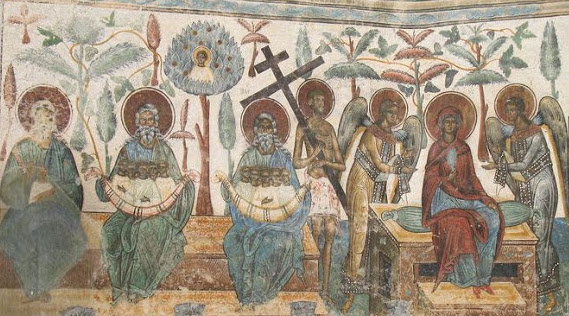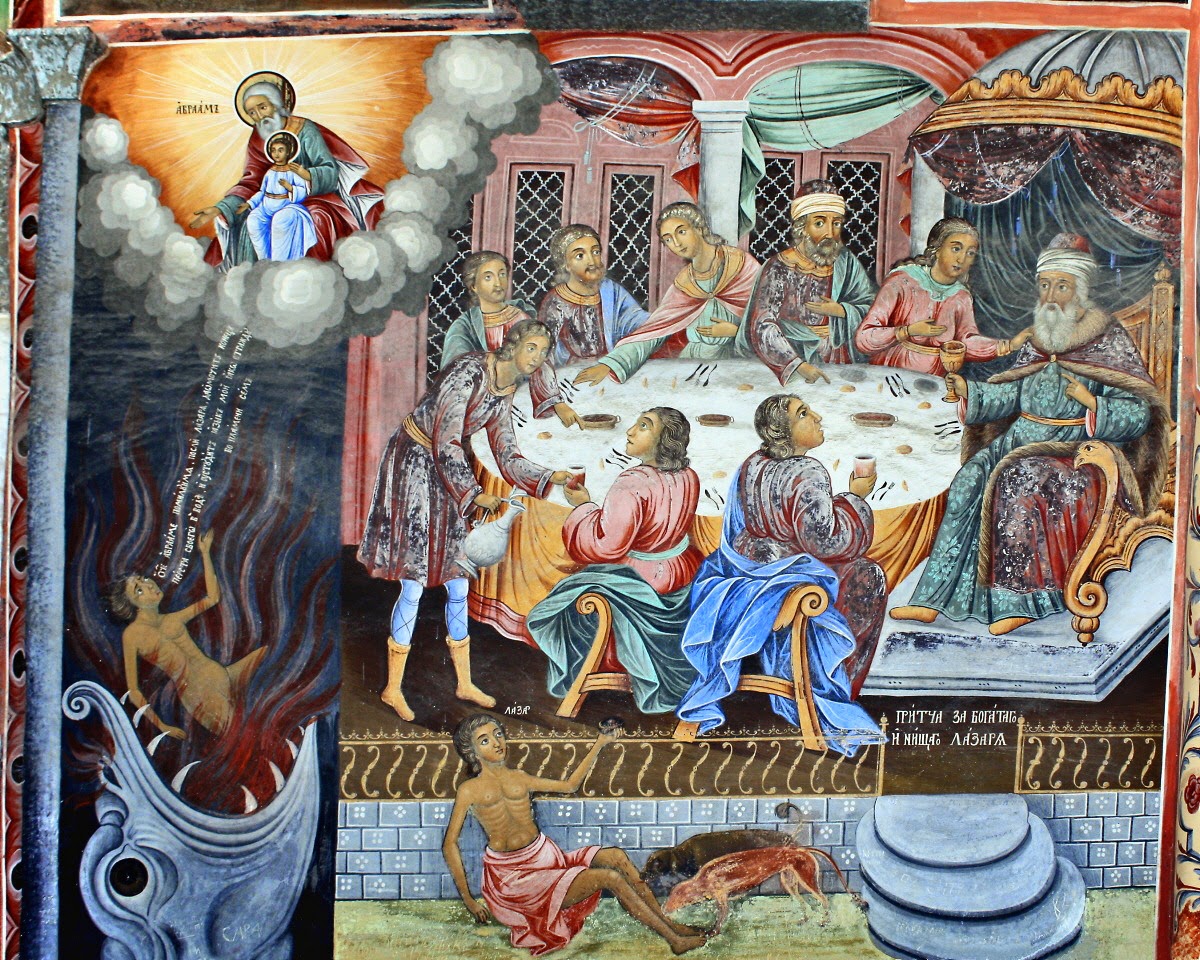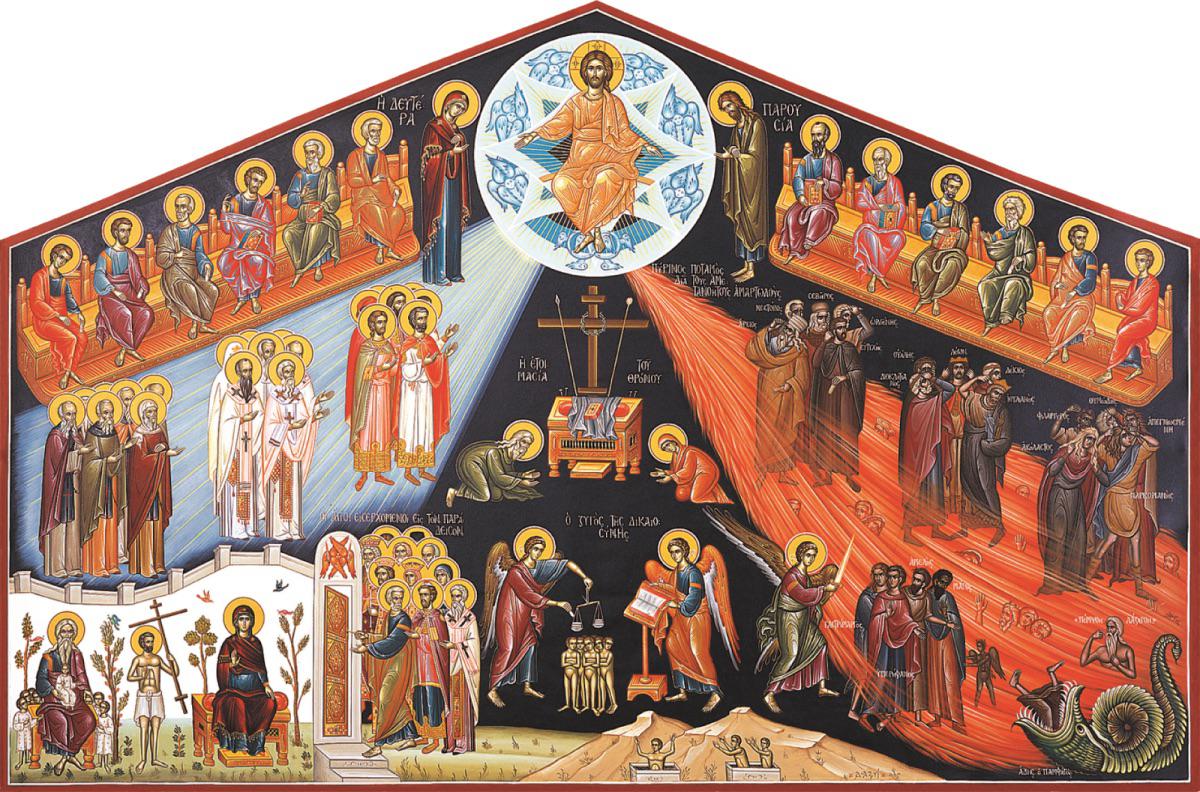
John 20:11-18 (Matins)
2 Corinthians 11:31-12:9
Lu 16:19-31
All There Is
There was a certain rich man who was clothed in purple .... and fared sumptuously every day.
But there was a certain beggar named Lazarus, full of sores, who was laid at his gate ....
In the Name of the Father and of the Son and of the Holy Ghost.
Amen.
Our Gospel lesson is one-of-a-kind.
Nowhere else in the Bible does the phrase "Bosom of Abraham" appear.
In fact, we can find it nowhere in the fragmentary record
save
in a scrapbook of Greek documents from Egypt
(Friedrich Preisigke, Sammelbuch Griechischer Urkunden aus Aegypten, Berlin, 1922).
Given the predilections of Judean religious authorities,
denying angels and the afterlife,
we should not be surprised.
The zeal shown for,
say, the Book of Ezra or its near duplicate,
the Book of Nehemiah,
duly recording Persian activity in the Levant,
would have been lavished on that material,
but not on this material.
By contrast,
the Essenes,
a Hebrew group similar in the size to the Jewish Pharisees,
lovingly preserved the Book of Enoch
(the most attested document among all Dead Sea Scrolls),
which is our best source for information
concerning
the afterlife
as well as
the War in Heaven,
angels,
and
demons.
No wonder,
the officials of Judah-ism permitted it to vanish.
Yet,
the Book of Enoch was manifestly important to Jesus and
(after the Ascension) to His Apostles.

St. Luke accords these things great emphasis
in a breathtaking icon written in words.
Let us pause here,
for this icon confronts us with all there is
—
the brevity of life in our temporary world
and,
surrounding our world,
with
the permanence and vastness of God's primary creations:
most desolate Hell and superabundant Heaven.
But I have omitted to mention one still greater marvel,
which is God's creation of Man,
for which all else has been prepared.
Let us consider the icon in detail:
|
There was a certain rich man who was clothed in purple and fine linen and fared
sumptuously every day. But there was a certain beggar named Lazarus, full of sores,
who was laid at his gate, desiring to be fed with the crumbs which fell from the
rich man's table. Moreover the dogs came and licked his sores. So it was that the
beggar died, and was carried by the angels to Abraham's bosom. The rich man also died
and was buried. And being in torments in Hades, he lifted up his eyes and saw Abraham
afar off, and Lazarus in his bosom.
(Lu 16:19-23)
|
The rich man is clothed in purple.
By this, we know that he is a billionaire (in our parlance).
The color purple as dye used in clothing
was very difficult to obtain and costly.
The most exalted personage in Second Temple culture,
King Cyrus of Persia,
dressed in purple.
Later Roman emperors forbade anyone to wear imperial purple upon pain of death.
During the ascendancy of the Roman Senate,
a stripe of purple was permitted upon a senator's tunic.
The rich man must have been obscenely obese,
for he ate sumptuously every day.
Now,
imagine a Thanksgiving feast setting our tables
seven days a week
with
no provision for fast days.
It would not take long before this prodigality
was seen in the form of our very persons.
We see that the beggar Lazarus is too weak, or perhaps disabled, to walk.
He must be laid at the rich man's gate.
We infer that such friends he has do not have food to share,
so they place him where there might be hope for a crumb.
We surmise that he is near death,
for the dogs are already gathering for a meal of his defenseless person:
"the dogs .... licked his sores. So it was that the beggar died."
If Lazarus were laid near the rich man's table
that
a crumb might fall his way,
we know that the rich man saw
the beggar up close and was apprised of his abject want in great detail.
We see the approach of death in the case of the beggar.
Death comes suddenly and without warning in the case of the rich man:
"the rich man .... died and was buried."
But we do not hear of any tomb, much less burial place, for Lazarus.
At death our attention moves immediately to the cosmic view,
which has always surrounded the earthly picture
as Heaven and Hell
has always surrounded our own world.
That is,
the rich man has always been present before God
(as we all are)
and
has been observed in the same detail with which he has observed the beggar
.... but more so.
☦
We speak of the Kingdom of Heaven as if it were
a state of mind
or
a state of being.
And it is.
We say that we must be heavenly to participate in it.
But we must never think that it ebbs and flows
according to our thoughts and feelings.
No.
The Kingdom of Heaven possesses and retains all of its powers and qualities
whether we pay attention to it or not.
It is quite simply the pure superabundance of God.
In His Kingdom we are completely with God.
Those who participate in this Kingdom do so, by the grace of God,
through their intentions to be always near to God.
His Kingdom is goodness itself.
God created all things and saw that they were good.
This point is made with heavy emphasis:
Genesis 1, verses 4, 10, 12, 18, 21, and 25,
and,
in case we missed it,
in verse 31:
|
"Then God saw everything that He had made,
and indeed it was very good."
(Gen 1:31)
|
By contrast, we do not have the capacity to make anything.
We can only rearrange what God has made.
For example, we cannot make new elements
augmenting the periodic table.
We are provisional creators either in God's Spirit of goodness
or,
contrary to that Spirit,
subverting what God has made,
which always results in evil.
For everything not of God is always of evil.
Within the scope of St. Luke's icon,
we see that God has created three domains.
There is endlessly vast and changeless Heaven.
There is boundless and permanent Hell
from whose precincts no one returns.
And there is our own world
—
a bounded, temporary place and time.
This
last domain God has placed completely entirely under our dominion
from its beginning:
The heaven, even the heavens, are the Lord's;
But the earth He has given to the children of men.
(Ps 116 (115):16)
|
As we have seen,
God created this world and life as originally good.
It is manifestly beautiful,
wondrous,
and
unique.
In our folly, we have shot into outer space trillion of dollars
which could have been directed to preserving and protecting God's little creation.
And what have we found more than half-a-century later?
Lifeless stones spinning in an empty void.
This is but one colossal example of creative activity on a grand scale resulting
in neglect and evil.
Actually,
God created our world three times.
The first time,
He made a world of goodness
inviting our first parents to follow Him in His goodness.
But in their freedom,
they rejected God choosing things not of God .... leading eventually
to disease and death.
With the constant descent of this world into evil
—
"every intent of the thoughts of [man's] heart was only evil continually"
(Gen 6:5)
—
God
finally
erased this world with a Flood.
With His second creation,
another set of ancestors,
Noah and his family,
were permitted to start again in faithfulness and goodness.
It would not take long, however, for them to transgress forbidden boundaries
with father drunkenness and mother incest
polluting the world God had renewed in goodness.
The third time,
God entered our world Himself:
as His Son, the God-man, Jesus of Nazareth.
Surely,
the Son and Heir
would be received in honor (Mk 12:7).
But from the beginning,
no honor was shown.
He would be made
an outcast among outcasts.
Decent quarters were denied
His Mother even in childbirth.
And His family were consigned to a cave
amongst dung-stained hay,
cradling the God-child in a feeding trough made of wood,
certainly teeming with fungus and bacteria.
This would be followed by a mass slaughter of innocents in
a manic attempt to kill Him,
pointing to His eventual
betrayal, torture, and murder.
Ironically,
in all the world He alone was good.
As I say,
we were placed in this bounded and temporary world
which has always been under our complete dominion.
We have had the final say concerning how it goes.
Our physics, too, are provisional and impermanent
according to the
generally accepted
Big Bang Theory
(which is the reason Nature Magazine rejected this theory when it was proposed).
In fact,
we are the generation who has lived to see the beginning of the end,
to the unraveling of a world that was never intended to last.
A primary theme of the icon
of the rich man and the beggar
is
God's goodness subverted.
The earth is abundant with food,
and
the seas are alive with every kind of fish.
There is plenty for all
(and there still is today).
But perversion drives God's goodness to its distorted extremes
—
to starvation unto malnutrition and death figured in the beggar
or
to gluttony unto sickness figured in the rich man.
It has always been entirely up to us to make our world after God's Image,
which is godly and good.

Yet, our world must also be free lest God be consigned to the role of puppet-master
or
as an inventor surrounded by robots.
His intentions have always been to make "man in His own image; in the image of God" (Gen 1:27).
Accordingly, We must be granted the Divine fire of freedom,
which by its nature is free to
abandon God rejecting His ways
or
to choose for God embracing His ways.
Two permanent, infinite, and eternal domains surround ours.
One domain grants the desire to be free of God.
In this domain nothing remains of the verdant world God made for us.
That is the point of its fire
—
constantly consuming what had been made.
Its many billions of inhabitants,
who rejected God,
doubted His Existence anyway.
We call this place Hell.
The other world,
equally boundless and permanent,
is the superabundance of God's Presence.
It has everything of the created goodness we have known but in perfection.
And there is more and greater still.
It is the domain of those who long for God.
St. Mary Magdalene and St. Mary of Bethany are its exemplars.
We call this place the Kingdom of Heaven.
Two worlds,
eternal and infinite,
where time has no relevance
and
space is without limit.
Hell and Heaven are the preeminent creations of God.
Our world,
a miniature from the outset,
was made to be a temporary time and place:
a miniature of Heaven
or
a miniature of Hell.
From the beginning it has always been up to us which it shall be.
Our nearness to God
and
finally our love of God
have always already
marked our only glimpses of real happiness.
We call this Divine experience Love.
It is good and beautiful and enduring.
And in the end those who have made God their all shall inherit it,
that is,
participate in the true Love and Faithfulness of God.
I do not equate "eternal life" to the Kingdom of God.
For permanence is an inherent property of the human creature
as millions of after-death experiences (with the advent of CPR) have attested.
The question is not whether we shall have life after death,
but rather where we shall have it.
Is it possible that anyone is unaware of Heaven and Hell,
the two primary features of God's plan?
We have known earthly love.
We have known the birth of children and the goodness of abiding friendship.
Surely,
we have seen Heaven.
And we have also suffered betrayal and willful neglect and the horrors of war.
Surely,
we have seen Hell.
But the selfish and dismissive rich man remains unconvinced.
You see, he is a skeptic.
But suddenly
seeing the reality of things,
he wants to rush back to the world to warn everyone.
He asks that Abraham send the beggar to warn them.
For surely seeing someone rise from the dead
will convince them that is not true:
"you only go around once!"
Perhaps we understand the truth
of Father Abraham's words:
"But he said to him, 'If they do not hear Moses and the prophets,
neither will they be persuaded though one rise from the dead.'"
(Lu 16:31)
|
As an aside,
we know that Jesus told this parable after the raising of his friend Lazarus,
who was most certainly dead ("Lord, he begins to stinketh").
For seeing someone rise from the dead makes no difference to the skeptic.
To ignore God,
to ignore the design of His Creation,
to ignore His all-important Plan,
to consider our world to be the primary, indeed, the only thing ....
now,
this is feat of unparalleled self-absorption and selfishness rising to
the level of
narcissism,
where nothing exists but oneself
is truly astounding.
Yet,
this is nothing compared to another feat:
the belief that our lives are the main thing
and
that everyone else is relatively unimportant.
This, of course, is the faculty required to watch people die on the
street before our very eyes,
to betray our friends and wives and husbands
because we have certain "needs."
You see, our "needs" are really the only thing that matters.
Indeed,
there are some people who regularly hand their "friends" disease and death,
not disclosing that they have incurable STDs.
The truth,
of course,
is that
our world is merely a waiting station,
a bus stop,
where the people (we say) "now living" are gathered.
But where are the vast majority?
Where are all the people who "passed away" (we say).
They have passed on to God's permanence.
After death,
the rich man discovered the true vocation of humankind,
which is to help others.
When we help others, we follow God (Mt 25).
The rich man feels the imperative of that vocation:
he wants to go out and "save the world."
Meantime,
no less a figure than
God Himself was laid at rich man's gate,
day-after-day,
as a final warning,
as a last chance.
For Who, really, is Lazarus the beggar?
The clues are all over the Four Gospels.
Who else has nowhere to lay His head?
Who else owns nothing but the clothes on his back?
Who else is presented to us dying with open wounds?
Who else does not own a grave to be buried in?
Who else goes to the Father after death?
And who else everlastingly bears the name "Resurrection"
(which was the overtowering meaning of the name Lazarus for all time)?
Indeed,
He discloses this detail quite plainly:
|
"I Am the Resurrection and the Life."
(Jn 11:25)
|
Jesus lies before each of us all of our lives.
He lies on street corners,
in doorways,
and
upon cardboard mats on subway grates.
But do we have a heart for Him?
Will we open our purses and our doors to Him?
He is our Creator and our God.
And we look into His eyes,
and
we
behold all there is.
But how can this be?
we ask in our superior position of education and material success.
How can filthy beggars
and
the world's starving people
have anything of importance to say?!
But be ware!
For we have been warned.
The great prophet Simeon has warned us
that
He is the Sign of Contradiction (Lu 2:34).
He is the One Who will overturn our logic
and
our little worlds.
And this is for our own good.
For the greatest mystery of all is that Almighty God has a heart for each of us ....
even for the most cruel of men,
who feasts ostentatiously before the poor and starving,
He will humble lay down at that gate day after day,
before the cruel man's face,
in order that his heart might melt.
And in this,
the cruel man will have chosen for God in the end
and
started down the road to his salvation.
In the Name of the Father and of the Son and of the Holy Ghost.

